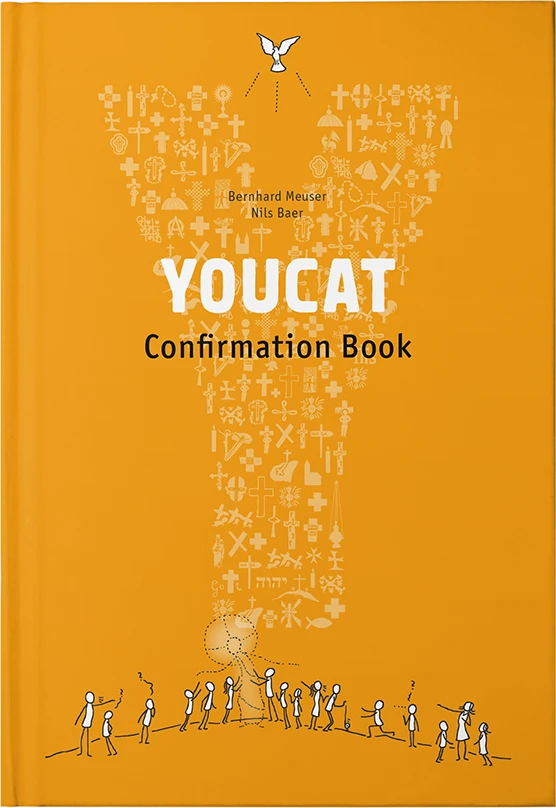

Credopedia
Devotion of the Sacred Heart of Jesus
Sacred Heart is a feast in the Catholic Church. It is about God’s divine love for humanity. An overview of important passages from the Bible and the catechism.
Definition
Sacred Heart of Jesus Devotion
The devotion to the Sacred Heart of Jesus is a spiritual practice in the Catholic Church derived from and inspired by several saints (e.g. Bernard of Clairvaux, Gertrude of Helfta, Francis de Sales, John Eudes, Maria Margarita Alacoque). In this devotion, the crucified love of God is particularly venerated. God’s heart, which is “full of mercy,” is truly pierced by the plight of humanity and also literally pierced for us (Jn 19:34). The first Friday of every month is devoted to the Sacred Heart of Jesus. Throughout the twentieth century, approximately 30 million people participated in the Sacred Hearf of Jesus movement.
What does the Holy Bible say?
The word “heart” appears around 400 times in the Bible. We are supposed to lay God’s work “in (our) heart” (Dt. 11:18); Israel “hardens” their “hearts” (Ps 95:8), or returns their “heart” back to God (1 Sam. 7:3). Israel somehow discovers the heart of God who says: “And I will give you a new heart, and a new spirit I will put within you. And I will remove the heart of stone from your flesh and give you a heart of flesh” (Ez 36:26). The yoke of God is easy; God is full of love and his heart is “gentle and lowly” (Mt 11:29).
The early Church always connected the heart of Jesus wounded by the lance with the prophecy of John 7:37-39: “If anyone thirsts, let him come to me and drink. Whoever believes in me, as the Scripture has said, ‘Out of his heart will flow rivers of living water.’ Now this he said about the Spirit, whom those who believed in him were to receive… .” In the liturgy of the Sacred Heart we can hear: “For raised up high on the Cross, he gave himself up for us with a wonderful love and poured out blood and water from his pierced side, the well-spring of the Church’s Sacraments, so that, won over to the open heart of the Savior, all might draw water joyfully from the springs of salvation.”
A short YOUCAT-Catechesis
Why does faith need the heart?
Concerning the vitality of Christianity, the ingenious German journalist and world traveller Peter Scholl-Latour once mentioned: “I am not worried about the strength of Islam, but about the weakness of the Occident. Christianity has in part already resigned. It does not possess any binding moral laws nor dogmas anymore.” It is true that those who are in love with the Church could become discouraged by how far the rational dilution of Christianity has already progressed in the Occident. Pope Francis has asked himself and the whole Church a profound question: “Are we still a Church that can warm the heart?”
We can be grateful that not everything has been destroyed by iconoclasm. It is a true miracle that the grotto of Lourdes, the image of the merciful Jesus of Sr. Faustina, the rosary and the devotion to the heart of Jesus have survived. In the midst of enlightened Christianity, even today there are strange, repulsive, trashy, vibrant and disagreeable forms of spirituality that are surviving to the extent that even erudite critics are aware of them. Martin Mosebach recently made the poignant remark in a speech in defense of popular devotion that “the high arts of Christianity have never found the admiration of the pious people or been connected to miracles or answered prayers.” It is perfect in a way that it can distract from what is truly important. Real faith is not about images, but about the devotion of the heart.
Saint John Henry Newman took as his slogan “Cor ad cor loquitur” (The heart speaks to the heart) — a saying not from the Bible but from Francis de Sales. Christianity is a religion of the heart, or it is not a religion at all. All the saints throughout history recognized this. “Our Lord,” little Theresa of Lisieux once said, “does not need great thoughts or beautiful ideas. He is not looking for talent nor intelligence. The Lord is content with a glance, with a sigh of love. It dawned upon me that it is enough to take our Lord by his heart.” Mother Teresa said: “Cast your eyes upon him who is light; turn your hearts closely towards his godly heart; ask for the grace to get to know him and for the grace to be able to love him and the courage to serve him. Earnestly search for him.” And the Vatican’s next saint (?), the devoted ‘Charles de Foucauld focused his life on this question: “What does the heart of Jesus desire?” And he came to this conclusion: “I am the slave of the heart of God. It is a slavery which I do not want to flee from… I will do what the heart of Jesus desires. I want to look at him and imitate him.”
The devotion of the heart of Jesus might be off-putting, but it is only as off-putting as the whole Incarnation was for the wise and intelligent of the world. The ancient people of Greece tried to reduce God to a “term.” Only Israel refused to follow suit. Israel found a God who spoke to them, and they listened. YOUCAT 7 says “Just as in human love one can know something about the beloved person only if he opens his heart to us, so too we know something about God’s inmost thoughts only because the eternal and mysterious God has opened himself to us out of love.” Before thinking, Israel resorted to prayer. Instead of describing the fire, Israel let herself be enkindled. Instead of taking hold of mystery, Israel allowed to be taken hold of by mystery — by a God who revealed himself in unfathomable ways, at last fully through the life of Jesus. 33 years and a catastrophe revealed what we can learn about God: God became a human heart. In Jesus, YOUCAT 7 says, “in his Son Jesus Christ, God has spoken again and again to mankind. In him he has poured out his heart to us and made his inmost being visible for us.” A soldier pierced Jesus side and “at once there came out blood and water” (Jn 19:34), so that “finally, finally the truth is revealed that God’s once-hidden name is love” (Hans Urs von Balthasar).
If all of human evil, spite and cruelty came together in the piercing of the lance at Golgotha, we can observe in it the greatest collision of opposites. A final strike confirms the death of the ultimate good. Evil hits God in his heart. But this strike fails in a spectacular way in the end; the piercing of the lance cannot kill God. “From his open side blood and water gush forth and from his heart the sacraments of the church come forth” — love and life for all generations.
If God offers up his heart for us, we are challenged to answer accordingly. Okay, to tell you the truth: An adequate answer does not exist. “We are half-hearted creatures, playing around with drunkenness, sex and ambition, in spite of being offered eternal joy” (C.S. Lewis). But grace exists that can turn stuttered answers into full sentences. The first adequate answer is adoration. Adoration is the acknowledgment of God’s greatness and the beauty of his love. He takes precedence. This results in an attempt to fix your life — or to put it better: to strive for holiness in your life. To cast our thoughts upon the pure, the beautiful and the great. To orient our conscience according to the intentions of Jesus (in case someone asks you how you know the ‘will of God). The son, says YOUCAT 44, “is the meaning and the heart of the world.“
Maybe the heartwarming power of faith, which Pope Francis requests for the renewal of the church, does exist. Again, Charles de Foucauld: “Open up your hearts widely, to receive what God gives you!”

YOUCAT Digital
Discover our digital products, which will help you to grow in faith and become missionaries yourself.







